Resume
Database Developer Cover Letter Examples

May 29, 2025
|
12 min read
Unlock your database developer potential with cover letter tips that drive success. Learn how to seamlessly 'code' your skills and achievements into a compelling narrative that opens doors to interview opportunities.
4.70 Average rating
Rated by 348 people
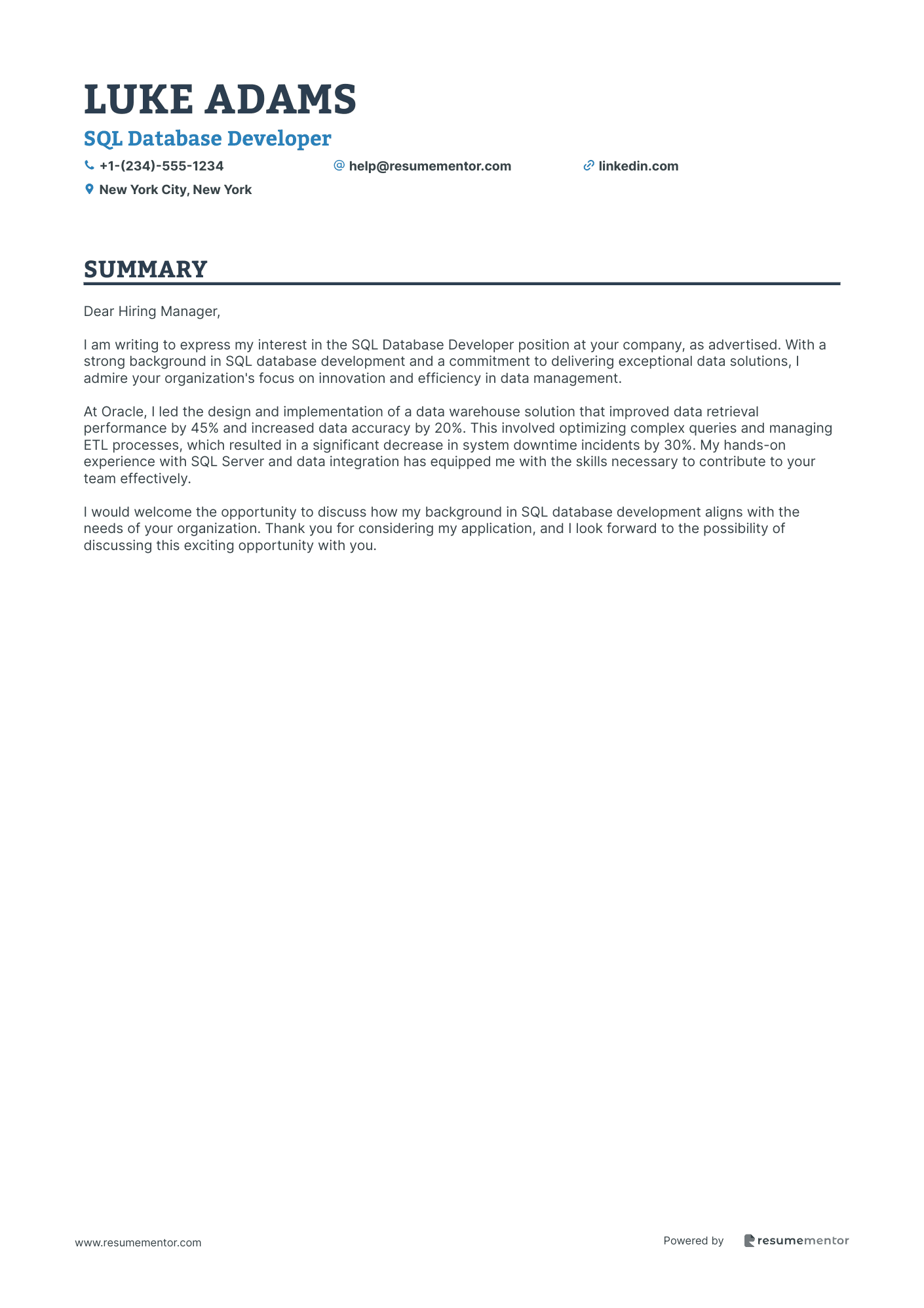
SQL Database Developer
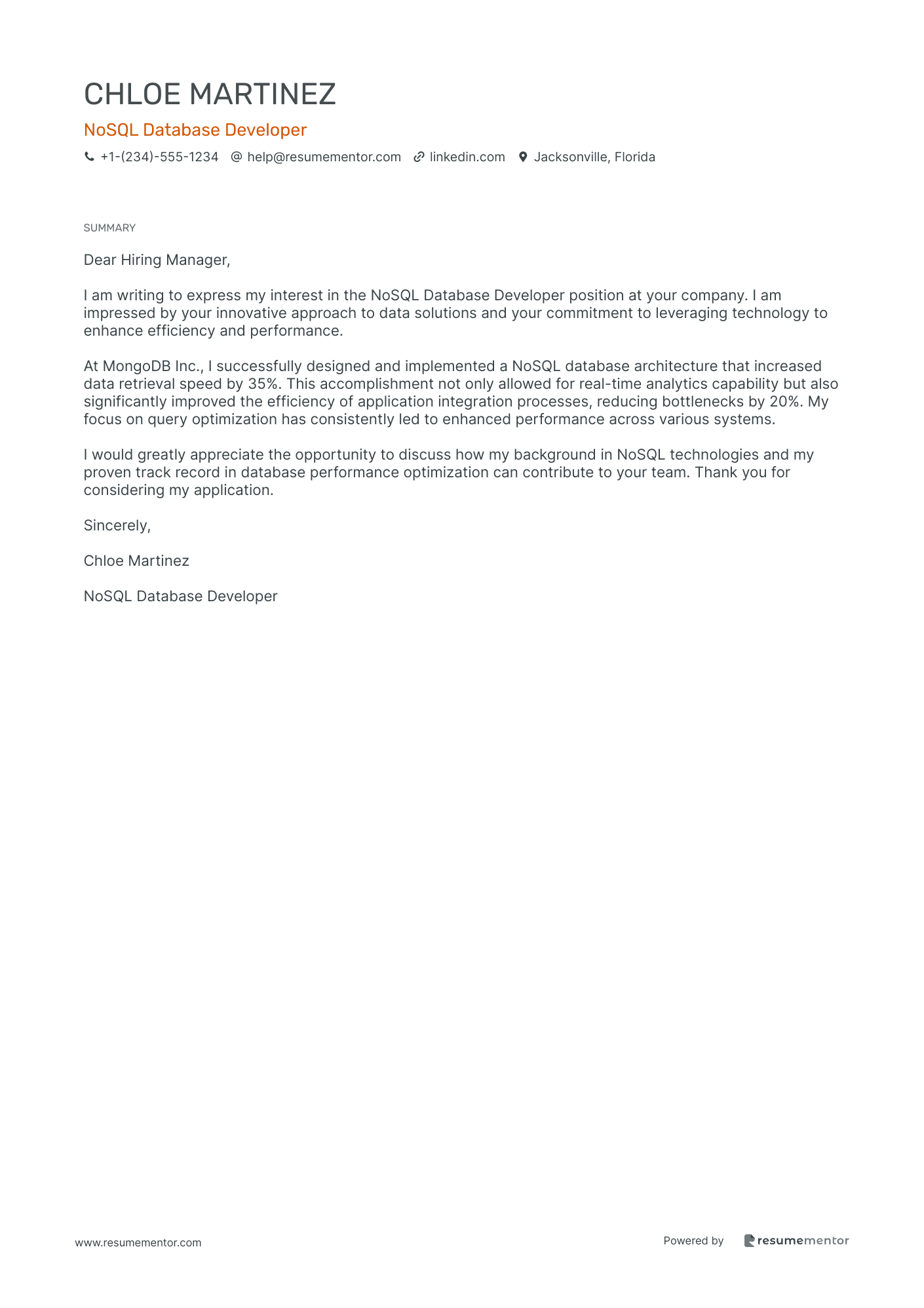
NoSQL Database Developer
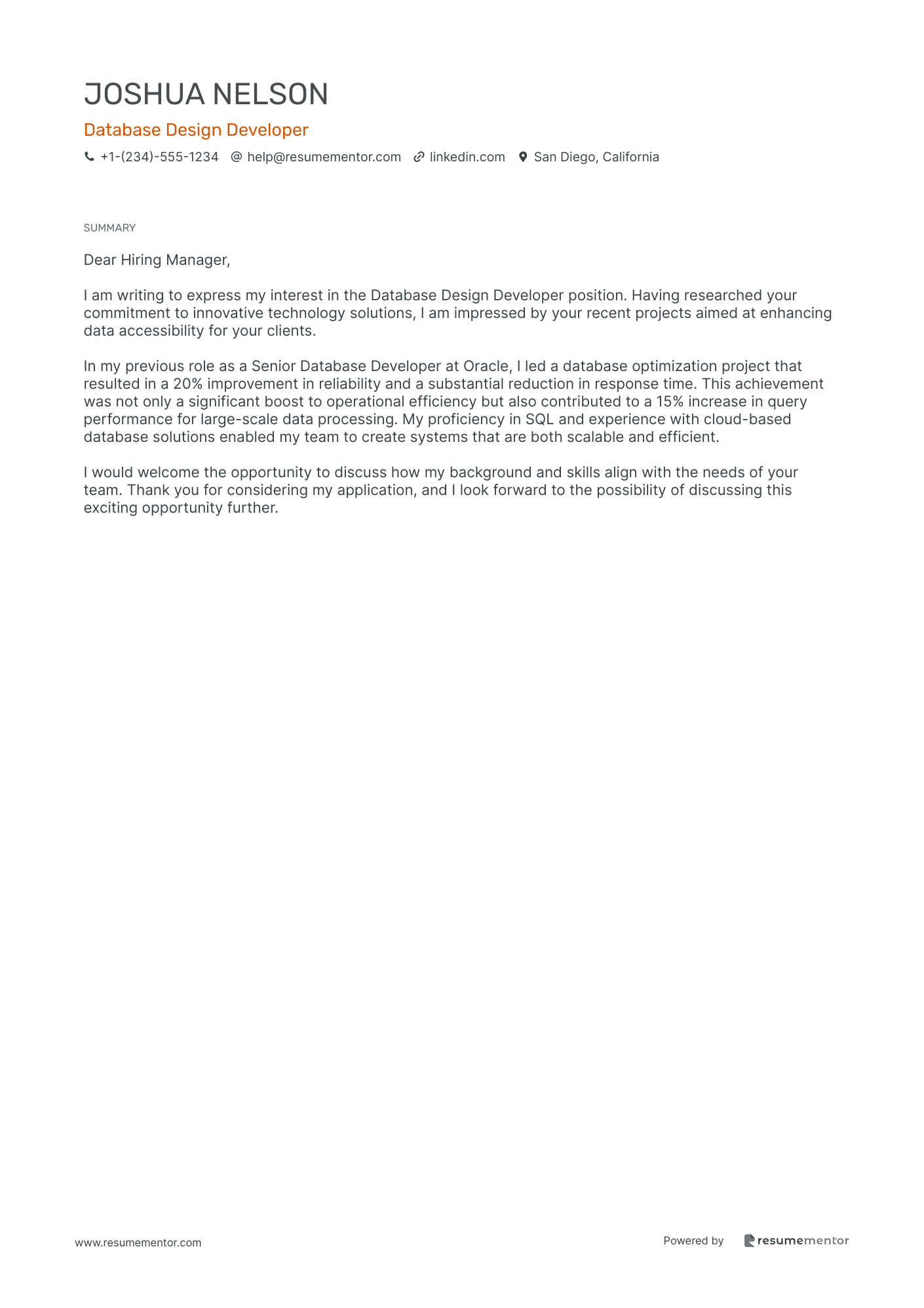
Database Design Developer
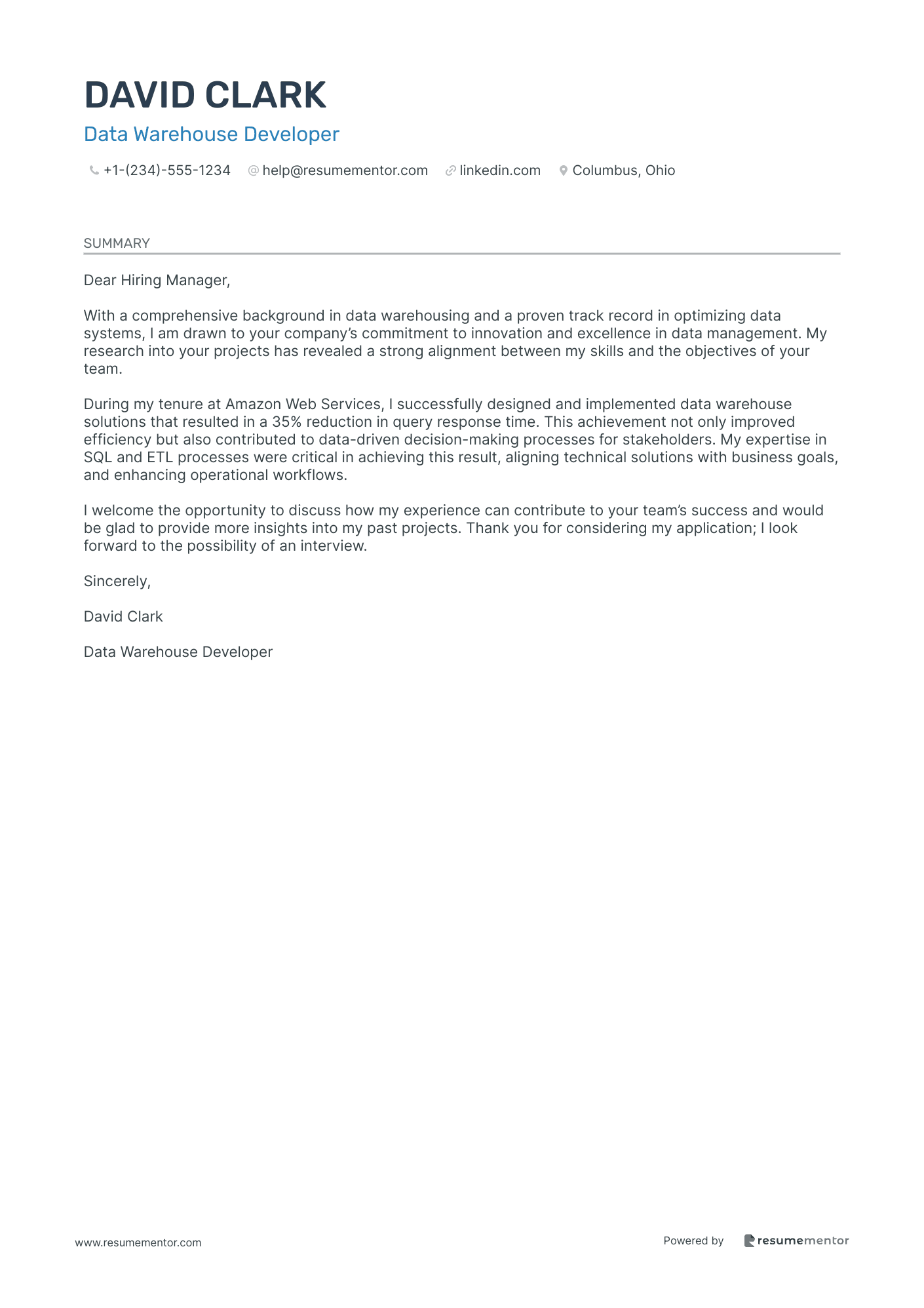
Data Warehouse Developer
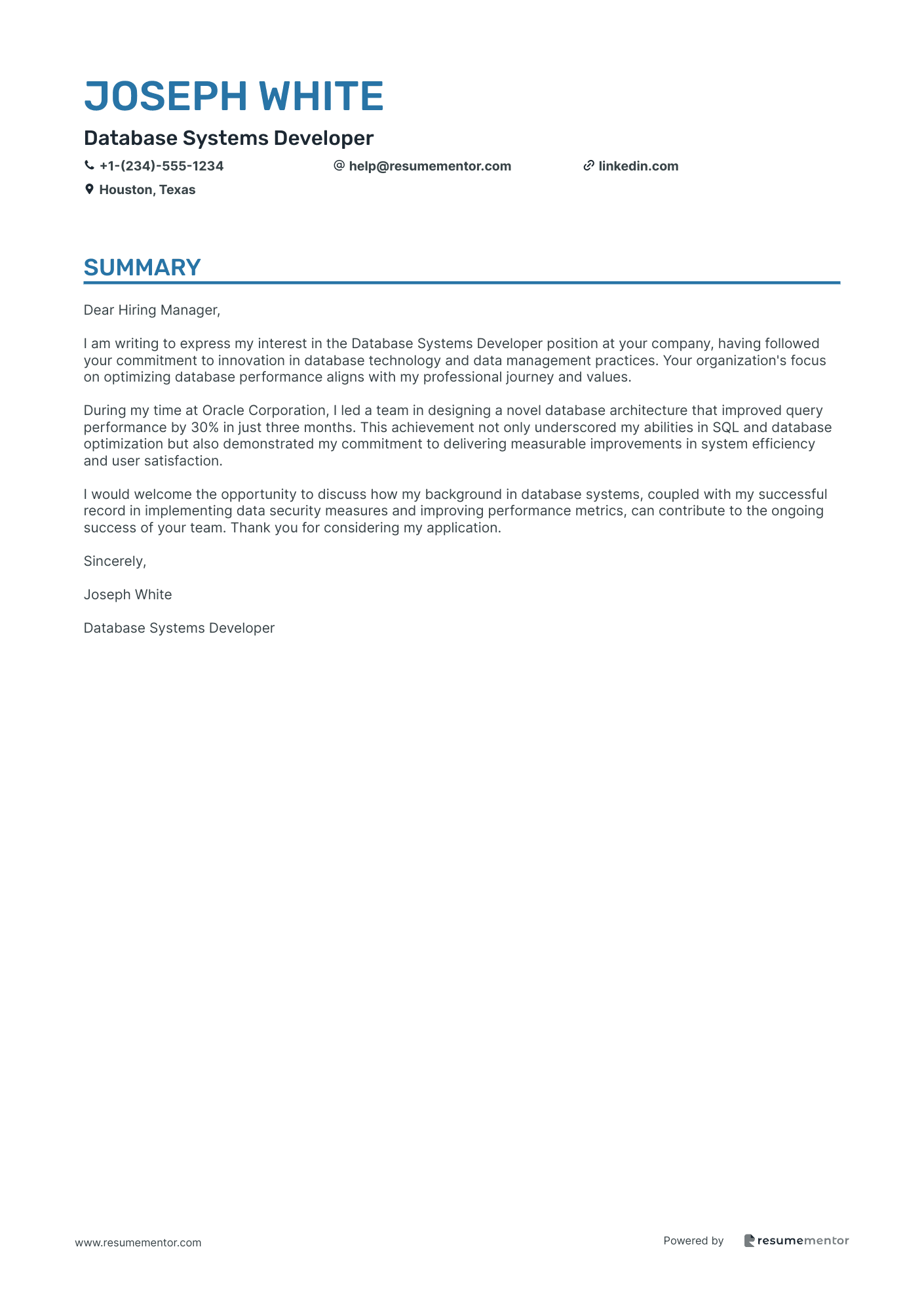
Database Systems Developer
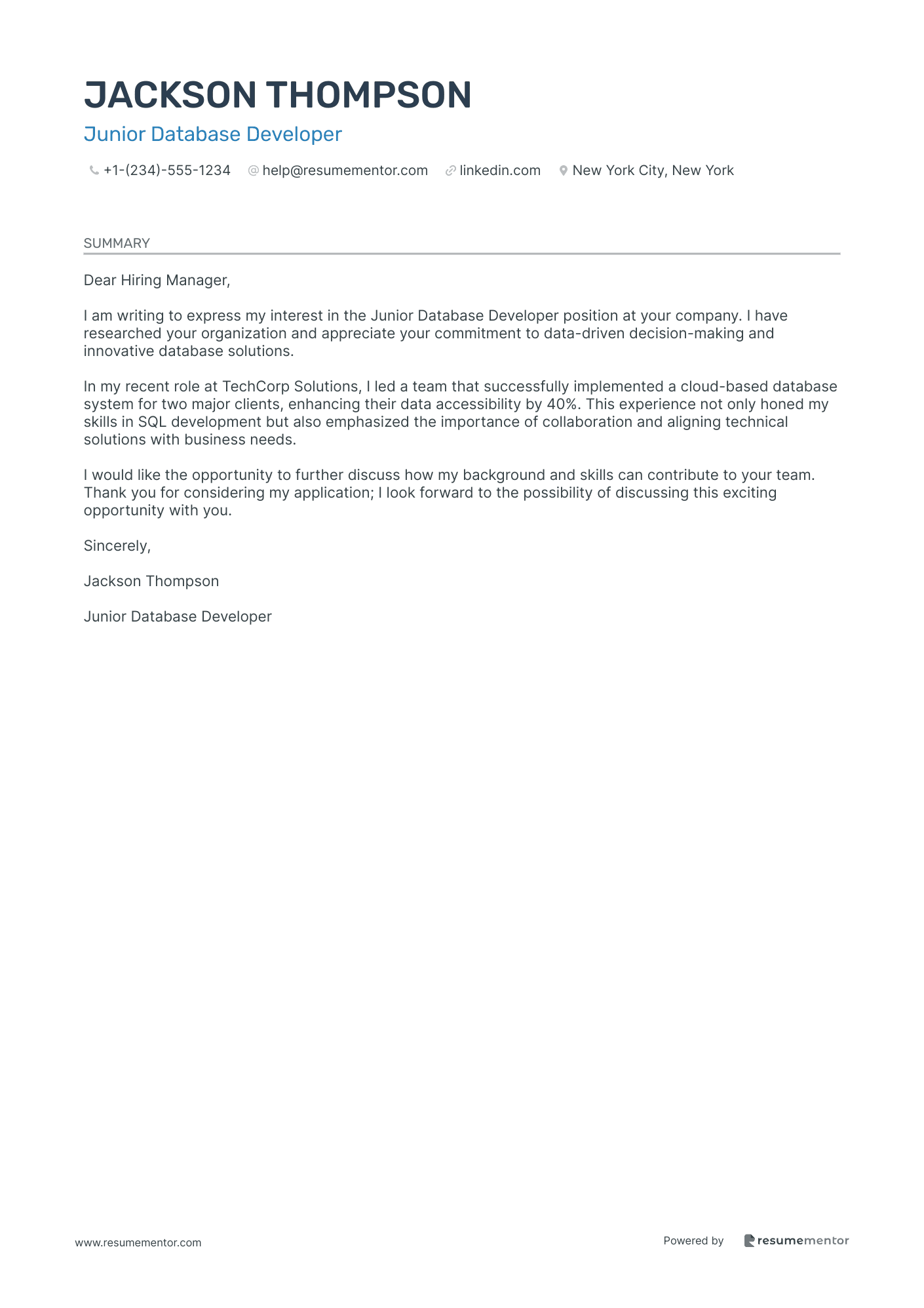
Junior Database Developer
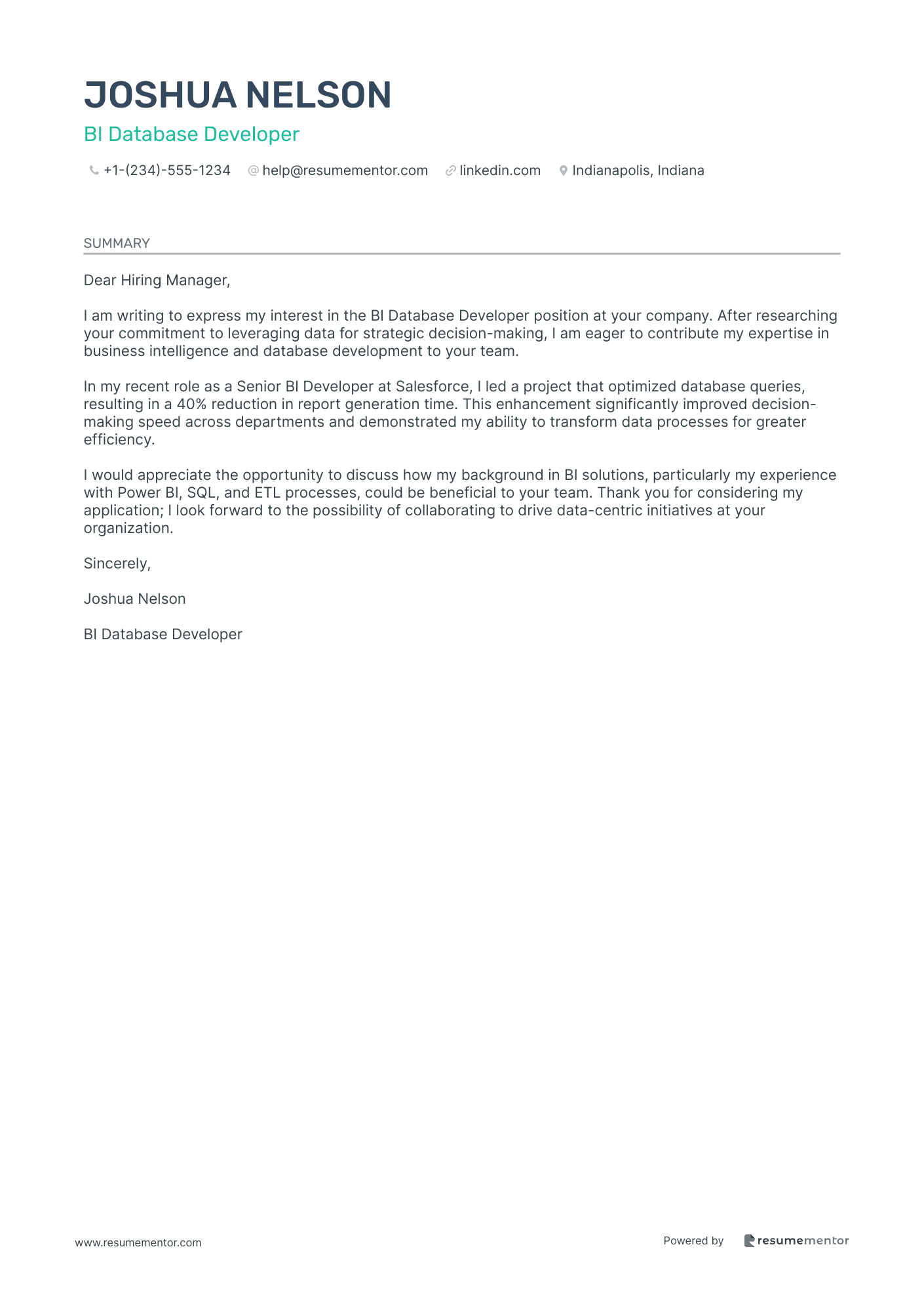
BI Database Developer
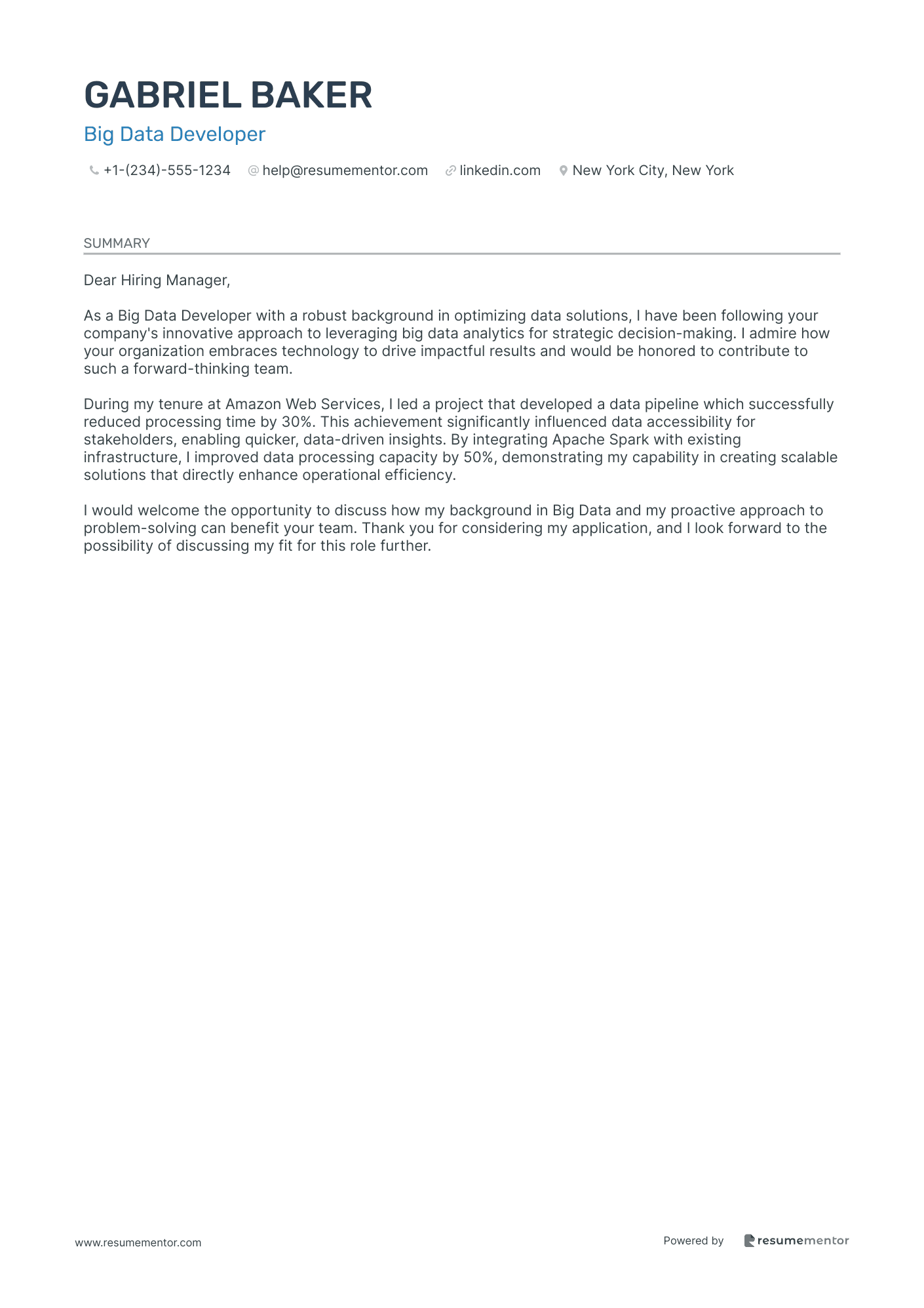
Big Data Developer
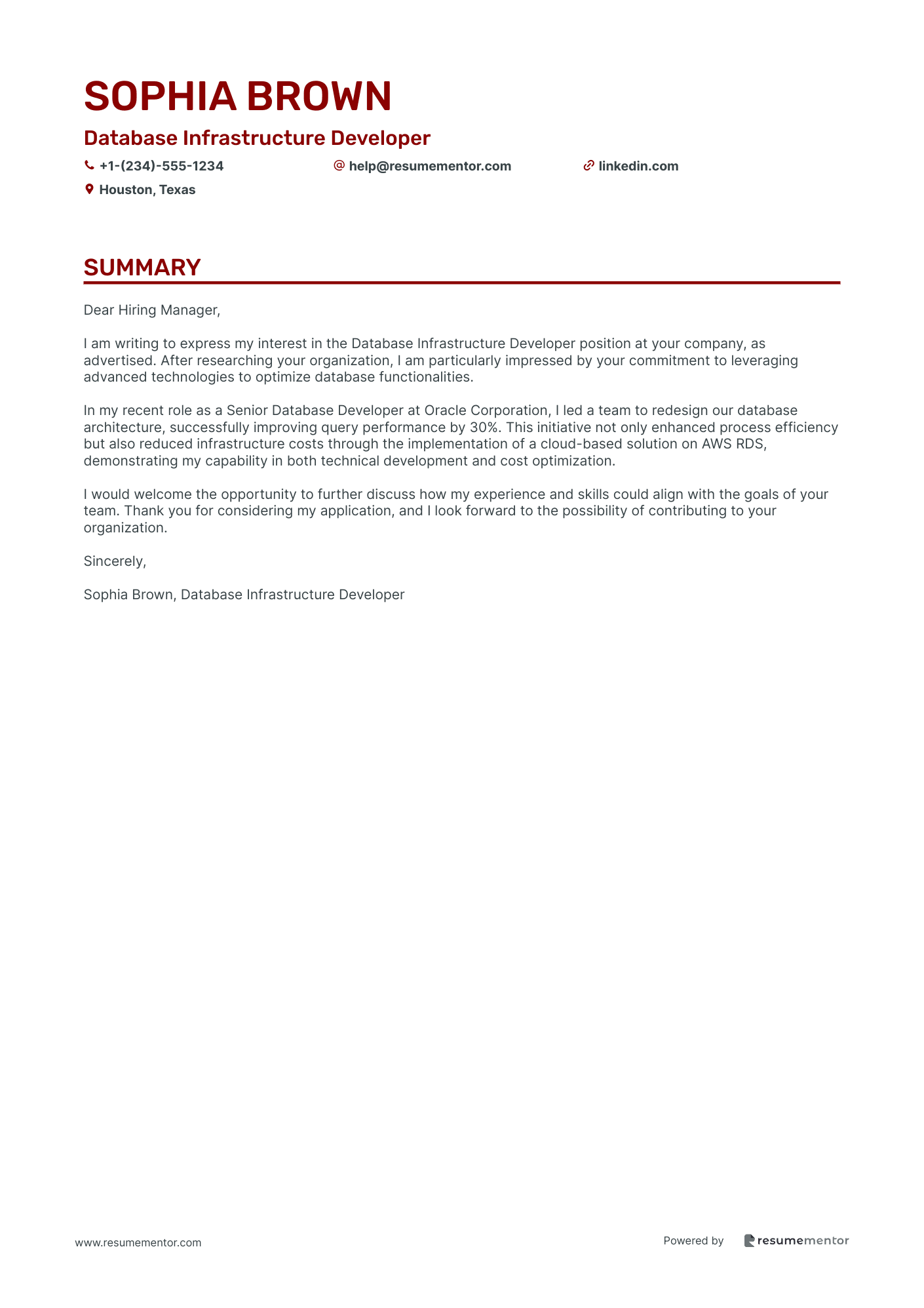
Database Infrastructure Developer

SQL Database Developer cover letter sample
When crafting your cover letter, emphasize your experience with database design and management. Highlight proficiency in SQL programming and data analysis tools. Mention any relevant certifications such as 'SQL Server Certification' or 'Data Analysis with SQL'. Include specific projects where you optimized database performance or improved data integrity. Use metrics to quantify your contributions, such as percentages of performance improvements or reductions in query times. This concrete evidence of your skills will demonstrate your capability and impact, making your application stand out.
Luke Adams
SQL Database Developer
Summary
Dear Hiring Manager,
I am writing to express my interest in the SQL Database Developer position at your company, as advertised. With a strong background in SQL database development and a commitment to delivering exceptional data solutions, I admire your organization's focus on innovation and efficiency in data management.
At Oracle, I led the design and implementation of a data warehouse solution that improved data retrieval performance by 45% and increased data accuracy by 20%. This involved optimizing complex queries and managing ETL processes, which resulted in a significant decrease in system downtime incidents by 30%. My hands-on experience with SQL Server and data integration has equipped me with the skills necessary to contribute to your team effectively.
I would welcome the opportunity to discuss how my background in SQL database development aligns with the needs of your organization. Thank you for considering my application, and I look forward to the possibility of discussing this exciting opportunity with you.
NoSQL Database Developer cover letter sample
When applying, focus on your experience with NoSQL databases like MongoDB or Cassandra. Highlight any projects where you've optimized database performance or improved data retrieval times. Discuss your proficiency in querying languages such as Aggregation Pipeline and how you've utilized indexing strategies. If you've completed relevant online courses or certifications, mention those to demonstrate your commitment to professional growth. Additionally, use specific examples to show how your database solutions led to increased efficiency or cost savings for your previous employers, following a ‘skill-action-result’ format.
Chloe Martinez
NoSQL Database Developer
Summary
Dear Hiring Manager,
I am writing to express my interest in the NoSQL Database Developer position at your company. I am impressed by your innovative approach to data solutions and your commitment to leveraging technology to enhance efficiency and performance.
At MongoDB Inc., I successfully designed and implemented a NoSQL database architecture that increased data retrieval speed by 35%. This accomplishment not only allowed for real-time analytics capability but also significantly improved the efficiency of application integration processes, reducing bottlenecks by 20%. My focus on query optimization has consistently led to enhanced performance across various systems.
I would greatly appreciate the opportunity to discuss how my background in NoSQL technologies and my proven track record in database performance optimization can contribute to your team. Thank you for considering my application.
Sincerely,
Chloe Martinez
NoSQL Database Developer
Database Design Developer cover letter sample
When applying for this role, highlight your experience with database design and management systems such as SQL or NoSQL. Emphasize your ability to create efficient data models and optimize query performance. If you have completed relevant projects or coursework in database theory or data architecture, mention these clearly. Use specific examples to demonstrate how your designs have improved data integrity or increased application efficiency. Frame your achievements using a 'task-action-result' approach to illustrate the tangible benefits you bring to previous projects or organizations.
Joshua Nelson
Database Design Developer
Summary
Dear Hiring Manager,
I am writing to express my interest in the Database Design Developer position. Having researched your commitment to innovative technology solutions, I am impressed by your recent projects aimed at enhancing data accessibility for your clients.
In my previous role as a Senior Database Developer at Oracle, I led a database optimization project that resulted in a 20% improvement in reliability and a substantial reduction in response time. This achievement was not only a significant boost to operational efficiency but also contributed to a 15% increase in query performance for large-scale data processing. My proficiency in SQL and experience with cloud-based database solutions enabled my team to create systems that are both scalable and efficient.
I would welcome the opportunity to discuss how my background and skills align with the needs of your team. Thank you for considering my application, and I look forward to the possibility of discussing this exciting opportunity further.
Data Warehouse Developer cover letter sample
When applying for this position, it’s important to emphasize your experience with database management and ETL processes. Highlight any familiarity with SQL or data modeling tools, as these are crucial skills. If you've completed certifications in data warehousing platforms such as AWS or Google Cloud, make sure to mention them. Use specific examples to illustrate how you streamlined data processes or improved data accuracy, following a ‘skill-action-result’ format. This approach shows your direct impact in previous roles and strengthens your application.
Summary
Dear Hiring Manager,
With a comprehensive background in data warehousing and a proven track record in optimizing data systems, I am drawn to your company’s commitment to innovation and excellence in data management. My research into your projects has revealed a strong alignment between my skills and the objectives of your team.
During my tenure at Amazon Web Services, I successfully designed and implemented data warehouse solutions that resulted in a 35% reduction in query response time. This achievement not only improved efficiency but also contributed to data-driven decision-making processes for stakeholders. My expertise in SQL and ETL processes were critical in achieving this result, aligning technical solutions with business goals, and enhancing operational workflows.
I welcome the opportunity to discuss how my experience can contribute to your team’s success and would be glad to provide more insights into my past projects. Thank you for considering my application; I look forward to the possibility of an interview.
Sincerely,
David Clark
Data Warehouse Developer
Database Systems Developer cover letter sample
When crafting your cover letter, emphasize your experience with relational databases and SQL proficiency. Highlight any projects where you've optimized database performance or implemented new systems. Mention certifications like 'Database Design' or 'SQL Fundamentals' to demonstrate your skills. Provide specific examples of how your work has improved data retrieval times or reduced errors, using a 'skill-action-result' approach. Make sure to showcase your ability to collaborate with cross-functional teams to meet project deadlines, illustrating your teamwork capabilities.
Joseph White
Database Systems Developer
Summary
Dear Hiring Manager,
I am writing to express my interest in the Database Systems Developer position at your company, having followed your commitment to innovation in database technology and data management practices. Your organization's focus on optimizing database performance aligns with my professional journey and values.
During my time at Oracle Corporation, I led a team in designing a novel database architecture that improved query performance by 30% in just three months. This achievement not only underscored my abilities in SQL and database optimization but also demonstrated my commitment to delivering measurable improvements in system efficiency and user satisfaction.
I would welcome the opportunity to discuss how my background in database systems, coupled with my successful record in implementing data security measures and improving performance metrics, can contribute to the ongoing success of your team. Thank you for considering my application.
Sincerely,
Joseph White
Database Systems Developer
Junior Database Developer cover letter sample
When applying for this role, it's important to highlight any relevant experience with database management systems like SQL or Oracle. Mention any projects where you designed, implemented, or optimized databases. Skills in data modeling and query optimization should also be emphasized. If you've completed coursework in database design or data analysis, be sure to include this information, along with any relevant certifications. Discuss specific instances where your contributions improved data retrieval speed or data integrity, using a 'skill-action-result' format to showcase your impact.
Jackson Thompson
Junior Database Developer
Summary
Dear Hiring Manager,
I am writing to express my interest in the Junior Database Developer position at your company. I have researched your organization and appreciate your commitment to data-driven decision-making and innovative database solutions.
In my recent role at TechCorp Solutions, I led a team that successfully implemented a cloud-based database system for two major clients, enhancing their data accessibility by 40%. This experience not only honed my skills in SQL development but also emphasized the importance of collaboration and aligning technical solutions with business needs.
I would like the opportunity to further discuss how my background and skills can contribute to your team. Thank you for considering my application; I look forward to the possibility of discussing this exciting opportunity with you.
Sincerely,
Jackson Thompson
Junior Database Developer
BI Database Developer cover letter sample
When applying for this role, focus on your experience with SQL, data modeling, and database design. Highlight your proficiency in databases like Microsoft SQL Server or Oracle. Mention any relevant certifications, such as Microsoft Certified: Azure Data Engineer Associate, to establish credibility. It’s also important to demonstrate your ability to analyze data for insights. Use real examples where your work improved data accessibility or reporting efficiency, showcasing your impact using the 'skill-action-result' format to drive home your contributions to past projects.
Joshua Nelson
BI Database Developer
Summary
Dear Hiring Manager,
I am writing to express my interest in the BI Database Developer position at your company. After researching your commitment to leveraging data for strategic decision-making, I am eager to contribute my expertise in business intelligence and database development to your team.
In my recent role as a Senior BI Developer at Salesforce, I led a project that optimized database queries, resulting in a 40% reduction in report generation time. This enhancement significantly improved decision-making speed across departments and demonstrated my ability to transform data processes for greater efficiency.
I would appreciate the opportunity to discuss how my background in BI solutions, particularly my experience with Power BI, SQL, and ETL processes, could be beneficial to your team. Thank you for considering my application; I look forward to the possibility of collaborating to drive data-centric initiatives at your organization.
Sincerely,
Joshua Nelson
BI Database Developer
Big Data Developer cover letter sample
When applying for this role, it's important to showcase experience with large-scale data processing frameworks like Hadoop or Spark. Highlight proficiency in programming languages like Java, Scala, or Python, as well as experience with SQL and NoSQL databases. Mention any completed projects where you optimized data pipelines or improved data accuracy. Certifications in data engineering or big data analytics can further strengthen your application. Use specific metrics to demonstrate how your work led to more efficient data handling or drove insights for your past employers.
Gabriel Baker
Big Data Developer
Summary
Dear Hiring Manager,
As a Big Data Developer with a robust background in optimizing data solutions, I have been following your company's innovative approach to leveraging big data analytics for strategic decision-making. I admire how your organization embraces technology to drive impactful results and would be honored to contribute to such a forward-thinking team.
During my tenure at Amazon Web Services, I led a project that developed a data pipeline which successfully reduced processing time by 30%. This achievement significantly influenced data accessibility for stakeholders, enabling quicker, data-driven insights. By integrating Apache Spark with existing infrastructure, I improved data processing capacity by 50%, demonstrating my capability in creating scalable solutions that directly enhance operational efficiency.
I would welcome the opportunity to discuss how my background in Big Data and my proactive approach to problem-solving can benefit your team. Thank you for considering my application, and I look forward to the possibility of discussing my fit for this role further.
Database Infrastructure Developer cover letter sample
When crafting your cover letter, focus on your experience with database management systems and any relevant programming languages like SQL, Python, or Java. Highlight your skills in designing, implementing, and maintaining complex database structures. Discuss how your work has optimized operations or improved data retrieval speeds. If you’ve completed projects that demonstrate your proficiency in database security or scalability, include those details. Use a ‘skill-action-result’ format to showcase how your contributions have added value to previous roles or enhanced efficiency.
Sophia Brown
Database Infrastructure Developer
Summary
Dear Hiring Manager,
I am writing to express my interest in the Database Infrastructure Developer position at your company, as advertised. After researching your organization, I am particularly impressed by your commitment to leveraging advanced technologies to optimize database functionalities.
In my recent role as a Senior Database Developer at Oracle Corporation, I led a team to redesign our database architecture, successfully improving query performance by 30%. This initiative not only enhanced process efficiency but also reduced infrastructure costs through the implementation of a cloud-based solution on AWS RDS, demonstrating my capability in both technical development and cost optimization.
I would welcome the opportunity to further discuss how my experience and skills could align with the goals of your team. Thank you for considering my application, and I look forward to the possibility of contributing to your organization.
Sincerely,
Sophia Brown, Database Infrastructure Developer
Related Articles

Continue Reading
Check more recommended readings to get the job of your dreams.
Resume
Resources
Tools
© 2026. All rights reserved.
Made with love by people who care.
